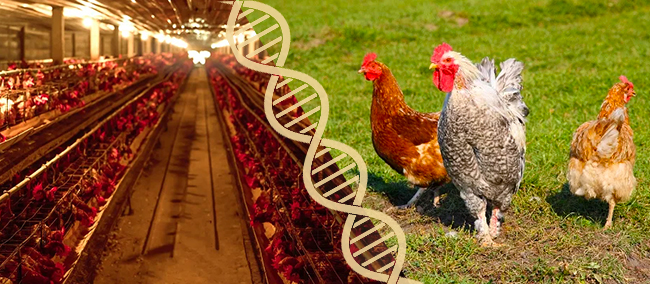
In today’s world, there is an increased emphasis on eating healthy and being environmentally friendly. One of the key factors in achieving these goals is the source of the food we eat. Consumers are now more conscious of where their food comes from and want to be sure that it is grown in an environment free of harsh chemicals that supports health.
But how can we be sure that the food we’re eating comes from an organic or free-range farm? Companies may have a good reputation or be certified by an organization, but can we really know for sure? This is where a new method developed by scientists in Germany comes in.
In a recent study published in Environmental Epigenetics, researchers at the German Cancer Research Center (DKFZ) have developed a method called “epigenetic analysis”. This method examines the chemical markers on the animal’s DNA to determine whether it was raised free-range or on a factory farm.
The term epigenetic pertains to gene expression changes resulting from factors other than DNA sequence alterations. DNA methylation is a key epigenetic modification that is influenced by environmental factors such as diet and toxins. Certain DNA methylation patterns are indicative of environmental exposures, such as air pollution or pesticides. By scrutinizing these patterns in livestock, scientists can determine if an animal has been subjected to specific environmental factors and even predict their susceptibility to diseases.
In previous articles, we have shown how DNA methylation is being studied in dairy cattle exposed to extreme heat and how it affects their milk production. We have also discussed how environmental toxins can cause changes in DNA methylation patterns, which can then be passed on to future generations.
Traditional food origin identification tests are often expensive, time-consuming, and limited in their accuracy. In the study, the researchers at DKFZ and their colleagues from Evonik investigated using DNA methylation marks on an animal’s genome as a unique fingerprint to identify the food’s origin. This method has the potential to be a more accurate and efficient way to ensure the authenticity of food products.
“The question of the origin of food is increasingly becoming a purchasing argument for consumers-especially when it comes to animal products and thus also to the well-being of animals,” said DKFZ professor Dr. Frank Lyko. “We have now established an amazingly sensitive detection method that maps many of the environmental factors that are relevant to animal well-being.”
Using a specialized DNA sequencing technique that identifies each methylated DNA building block, the researchers were able to conduct a methylome analysis and identify distinct populations of marble crayfish from various regions. They could differentiate between animals from clean or eutrophic waters and those raised in the laboratory. Additionally, the researchers were able to track the changes in methylation patterns over time when transitioning between two types of animal husbandry.
The team partnered with Evonik to expand their analysis of the methylome of animals commonly consumed in the human diet. Their investigation revealed variations in the methylation patterns of shrimp from different rearing facilities and of salmon from slow-flowing rivers versus mountain streams. They also found that the farming environment and feed supply influenced methylation patterns in chickens, with variations seen between free-range and factory-farmed chickens.
“Methyl fingerprints could expand the possibilities of food analysis as an important biomarker,” said co-author and DKFZ researcher Sina Tönges. “However, sequencing as we applied it in this study is a laborious procedure that cannot be routinely performed in food analysis. We are therefore working with Evonik to develop a test system for methylome fingerprinting that can also find its way into laboratories on a broad scale.”
Although more work is needed to refine this method, epigenetic analysis holds promise in identifying the natural origin of animal products and advocating for sustainable farming practices. If applied, this method could promote a healthier and more sustainable food system.
Source: G. Venkatesh et al. Context-dependent DNA methylation signatures in animal livestock. Environmental Epigenetics, January 23, 2023.
Reference: Koh. Epigenetic fingerprint as proof of origin for chicken, shrimp and salmon. German Cancer Research Center. March 28, 2023.

